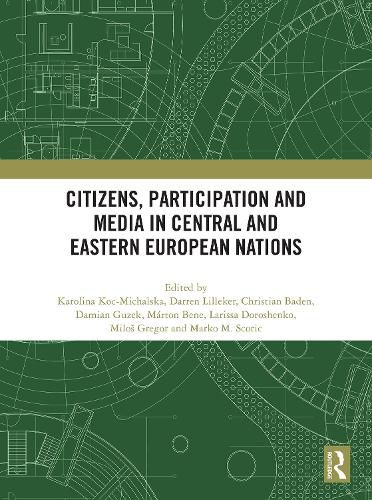Readings Newsletter
Become a Readings Member to make your shopping experience even easier.
Sign in or sign up for free!
You’re not far away from qualifying for FREE standard shipping within Australia
You’ve qualified for FREE standard shipping within Australia
The cart is loading…






Central and Eastern European (CEE) countries have faced significant political, economic, social, and technological transformations over the last four decades. Democratic processes, after relative stabilisation, have begun to tremble again around polarizing values, populist leaders, or nationalistic ideologies. Online communication, especially social media platforms, play a vital role in shaping how citizens interact with the state, political actors, media, and other citizens.
This book focuses on some of the challenges democratic institutions in Central and Eastern European (CEE) countries face in transforming and sustaining civil society and captures how the digital media environments mitigate or exacerbate those challenges. The chapters in this book focus on the role that online platforms play in shaping satisfaction with democracy in the CEE region, the interactions between journalists and political actors, the strategic media coverage of elections, affective polarisation and political antagonism, and discursive attempts to discourage young people from civic engagement. The first section of the book looks at CEE countries from a comparative perspective, and the second section examines specific case studies within different CEE countries such as Albania and Kosovo, Czechia and Hungary, Poland and Ukraine.
This volume will be a key resource for scholars and researchers of Communication Studies, Politics, Media Studies, Sociology and Central and Eastern European studies. The chapters in this book were originally published in the Journal of Information, Technology & Politics.
$9.00 standard shipping within Australia
FREE standard shipping within Australia for orders over $100.00
Express & International shipping calculated at checkout
Central and Eastern European (CEE) countries have faced significant political, economic, social, and technological transformations over the last four decades. Democratic processes, after relative stabilisation, have begun to tremble again around polarizing values, populist leaders, or nationalistic ideologies. Online communication, especially social media platforms, play a vital role in shaping how citizens interact with the state, political actors, media, and other citizens.
This book focuses on some of the challenges democratic institutions in Central and Eastern European (CEE) countries face in transforming and sustaining civil society and captures how the digital media environments mitigate or exacerbate those challenges. The chapters in this book focus on the role that online platforms play in shaping satisfaction with democracy in the CEE region, the interactions between journalists and political actors, the strategic media coverage of elections, affective polarisation and political antagonism, and discursive attempts to discourage young people from civic engagement. The first section of the book looks at CEE countries from a comparative perspective, and the second section examines specific case studies within different CEE countries such as Albania and Kosovo, Czechia and Hungary, Poland and Ukraine.
This volume will be a key resource for scholars and researchers of Communication Studies, Politics, Media Studies, Sociology and Central and Eastern European studies. The chapters in this book were originally published in the Journal of Information, Technology & Politics.